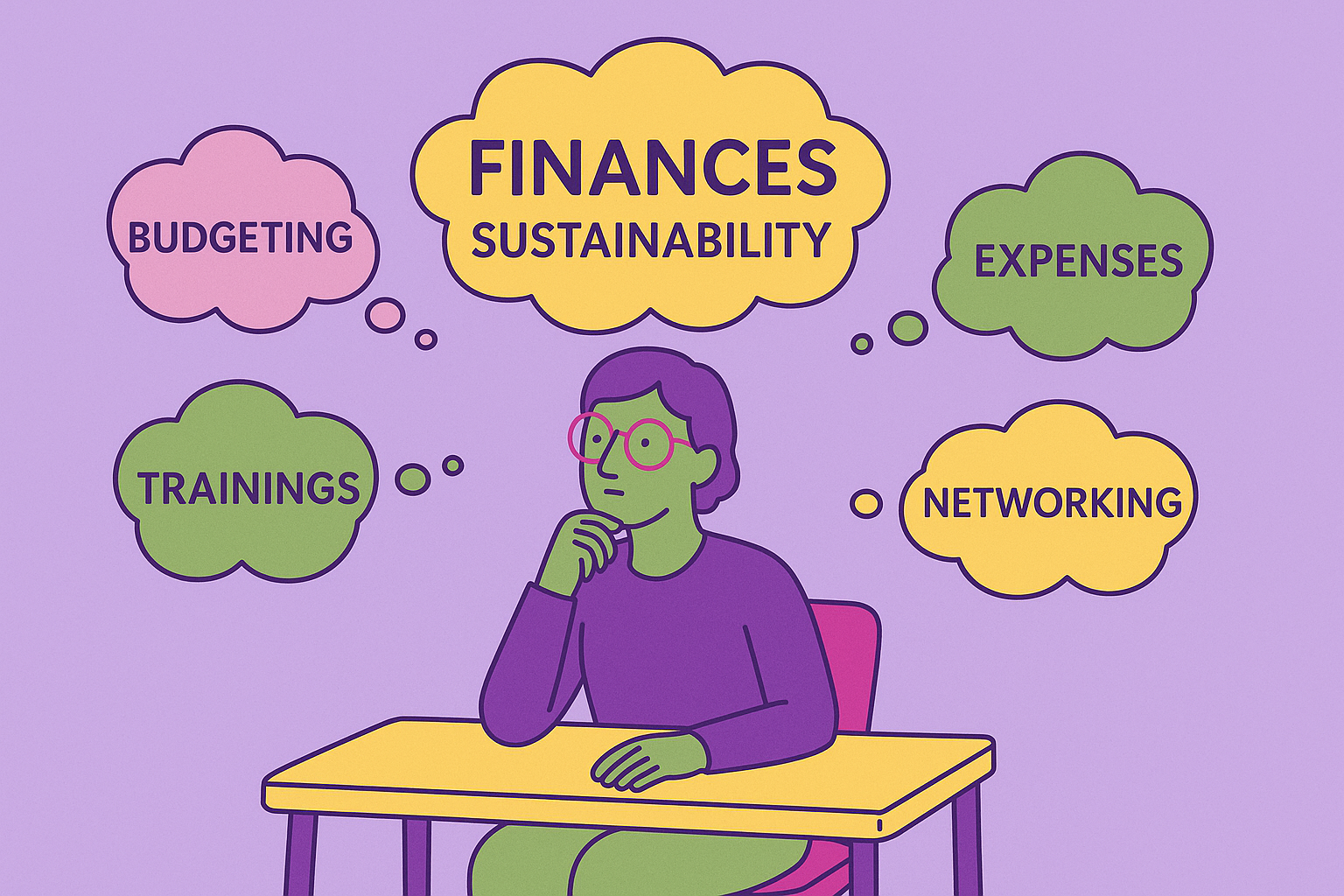Building a Financially Sustainable Private Practice

Starting a private practice is an exciting yet challenging journey for therapists. One of the most significant challenges is achieving financial sustainability, especially in the early stages. Building a financially sustainable practice comes with challenges, such as inconsistent sessions, client dropouts, balancing expenses for training, supervision, and personal needs, and managing feelings of imposter syndrome. However, with effective planning, budgeting, and self-compassion, you can gradually navigate these challenges and create a stable foundation for your private practice.
Let’s discuss some actionable steps to create a thriving online private practice!
Financial Planning Fundamentals
One of the first challenges in building your practice is dealing with an unsteady income, especially in the beginning. Seasonal fluctuations and unpredictable client retention can make financial planning challenging. Acknowledge these realities and prepare with the following steps:
Create Therapy Packages: Offering therapy packages(e.g., 5–10 sessions) with a marginal discount encourages consistent sessions and ensures a steady workflow. These packages are helpful to clients who value structured and long-term support.
Budgeting: Track your income and expenses regularly. Create a monthly budget tracker for the following:
- Total Monthly Income
- Therapy Expenses
- Supervision Expenses
- Upskilling/Training
- Savings
Saving for Lean Periods: Set aside a portion of your earnings during busy months to cushion slower ones. This is how can you plan for busy and slower months:
Track Busy and Slow Months:
Keep a note of your busiest months and those that are typically slower. For example:
- Busiest Months: June –September (clients returning from summer vacations).
- Slower Months: December–January (holidays like Christmas and New Year) or October–November (festivals like Diwali).
Allocating a portion of your earnings to a savings fund during the busier months helps in planning finances and professional commitments better.
Invest in Professional Growth During Slower Months:
Use quieter periods to focus on personal and professional development. For instance:
- Enroll in online courses, training programs or workshops to upskill.
- Revisit and refine your practice’s operational strategies.
- Reflect on client progress and review session notes to enhance future work.
Financial Investments:
Learn about financial investments like Fixed Deposits and Systematic Investment Plans to diversify your income and build long-term security.
Diversifying Income Streams
"Don’t put all your eggs in one basket."
Relying solely on conducting client therapy sessions may not be very sustainable in the long run. Diversifying your offerings can help create consistent revenue while expanding your reach and it also gives you the opportunity to strengthen other skills:
Before exploring additional ways to diversify your income, it’s essential to reflect on a few key factors:
- Target Audience: Who are you aiming to support?
- Challenges They Face: What issues are they commonly dealing with?
- Support They Seek: What are they looking for in therapy or guidance?
- Practical Solutions: What strategies or tools can help them manage these challenges?
For instance, if you work with adults aged 25–30, think about ways to connect with this demographic through workshops, collaborations, or passive income resources like e-books and guides. Tailoring your offerings to their needs will make your practice more impactful and financially sustainable.
- Workshop Ideas: Intimacy in long distance relationships, Managing life independently away from home, Managing conflicts and confrontation with colleagues at workplace
- Digital Resources for passive income: An Anxiety Management Workbook, Tips for Cultivating Work-Life Balance, Navigating conflicts in intimate relationships
Collaborate: Partner with schools, NGOs, or corporate organizations to deliver workshops or mental health programs tailored to their needs. Additionally, engage with individuals in your social circle to identify the primary concerns of their communities and develop customized workshop proposals and plans.
Marketing and Networking
"Your online presence is the doorway to your practice."
Online Marketing
Develop content that speaks directly to the experiences and needs of the audience you aim to serve, using accessible and relatable language. Ensure that the scenarios and challenges addressed resonate with their everyday lives.
For instance, instead of general posts on anxiety and mindfulness for young adults, focus on specific scenarios such as managing anxiety before exams or preparing for a job interview. Such tailored content is more impactful and engaging.
Network with fellow professionals
Join WhatsApp groups, communicate with fellow therapists on social media platforms and participate in live events and therapist meetups to share knowledge and experiences. This often gives us the opportunity to know other like minded professionals, and explore possibilities of collaboration with them.
Revising Your Fee Structure
"Your fees are a reflection of the value you bring to your clients and the investment you make in your growth. Adjusting them is not just a necessity—it’s a step towards honoring your expertise and sustaining your impact."
As you gain experience and expertise, ensure your fees reflect your training, skills, and financial commitments. Incremental fee increases are fair and necessary to sustain your practice. When adjusting your rates:
- Communicate changes transparently with clients: Share your reasons for the adjustment and provide ample notice, maintaining an open line of communication.
- Highlight the value of your services: Emphasize your growing expertise, specialized training, and any additional resources or enhancements you’re introducing to your practice.
- Offer support during the transition: For clients who may find the new rates challenging, discuss sliding scales or explore other affordable options where feasible.
Seek Feedback and Build Credibility
"Feedback is the compass that guides your growth, and credibility is the bridge that connects you to trust. Together, they lay the foundation for a thriving practice."
Encourage clients to share anonymous feedback and testimonials. Displaying positive reviews on your website or social media can enhance your credibility and attract new clients. Additionally, feedback helps refine your services, improving client retention and satisfaction.
Creating a financially sustainable private practice is a journey that requires patience, adaptability, and self-compassion. By embracing financial realities, diversifying income streams, leveraging marketing platforms, and maintaining a healthy money mindset, you can build a practice that aligns with your goals.
Remember to be kind to yourself as you navigate this new terrain. Most therapists aren’t taught the business side of running a practice during their master’s program, so you’re learning something entirely new. Celebrate your growth, avoid overstretching, and remind yourself that sustainable success takes time.
“Are you feeling overwhelmed by the complexities of creating a financially sustainable private practice?
Does juggling inconsistent income, marketing strategies, and client retention leave you questioning your next step?”
You don’t have to navigate this alone.
Raah is here to support you in building a private practice that aligns with your values and goals. Whether you’re just starting out or looking to enhance your existing practice, Raah can provide guidance for:
- Designing structured payment policies to streamline your finances.
- Crafting packages and offerings tailored to your client base.
- Developing effective marketing strategies for platforms like Instagram, LinkedIn, and more.
- Exploring passive income streams like workshops and digital resources.
- Building community trust through workshops, webinars, and strategic collaborations.
Reach out today and take the first step toward creating a thriving and balanced professional journey.

Misha Gada
I’m Misha Gada, a 22-year-old Counseling Psychologist driven by a passion for mental well-being and breaking the stigma around mental health. I aspire to work with couples and adults, helping them navigate challenges and embrace their unique experiences; while also exploring and supporting individuals from diverse backgrounds. When I’m not creating inclusive therapeutic spaces, you’ll find me lost in a good book, experimenting in the kitchen, or discovering cozy cafes—coffee in hand, of course!
Related Blogs
No related blogs available.

